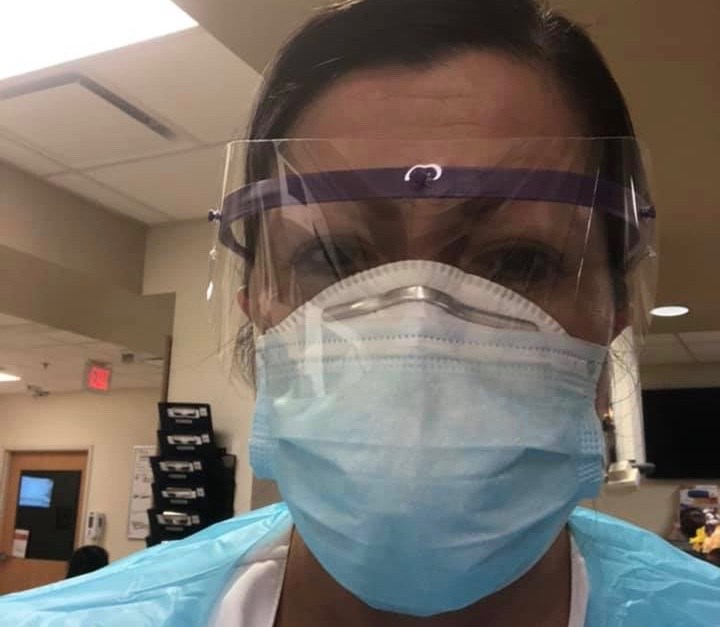Bernice Sutherland says healthcare workers are getting burned out and, as a nurse herself, she is exhausted.
Sutherland, 50, who grew up in Moosonee, is working at a hospital in Jacksonville, Fla.
She says she’s always wanted to be a nurse and jests she’s done “things backwards.”
First, she got married and had two sons, now aged 28 and 24. When her first son was born, she dropped out of high school but returned to finish her secondary education. Then, she studied nursing at the Northern College in Moosonee and graduated from the program in 1999.
She recalls it was challenging having a newborn and a three-year-old son and going to school five days a week. She also had to travel by boat during the ice breakup season or by helicopter when the river was freezing.
Sutherland worked as a nurse in Moose Factory for a few years before moving to Florida in 2004, where she is still residing. She passed the National Council Licensure Examination (NCLEX) and is able to practise nursing in both Canada and the U.S.
In her over 20 years of experience, she’s worked as a charge nurse and a chemo nurse and has also worked in telenursing, obstetrics, geriatrics and pediatrics.
Back in March, she was planning to take a vacation for three weeks to visit her family, celebrate her 50th birthday and her grandson’s first birthday but then the pandemic hit.
“And now I’m stuck here. I can’t go anywhere,” she says. “It makes me sad because I’m here in Florida, I have no family. Florida has broken records and I’m like, ‘Oh my god, I’m never going to go home.’ That’s how I feel and that makes me sad.”
On Sunday, July 12, the Florida Department of Health reported the biggest one-day increase in COVID cases with 15,300 people testing positive.
Initially, Sutherland worked in the observation unit but when the pandemic hit, she was transferred to the COVID unit. Working in the observation unit meant taking care of patients who have symptoms like chest pain and shortness of breath but don’t need to stay as inpatients and can be discharged from the hospital within 24 hours.
When she was working in the COVID unit, her typical day would start around 5 a.m.
She wouldn't eat breakfast and would arrive to work at 6:30 a.m. She would look up how many patients she had and how many were COVID patients. Then, she would put on her personal protective equipment like an N95 mask and a face shield, clock into work at 6:53 a.m. and receive a report from a night shift nurse.
After working a 14-hour day shift for three days in a row, Sutherland says she needs a full day to “decompress.” Sometimes, she has trouble sleeping because of the constant stress.
“When I’m at work, I’m constantly running and when I come home and sit for a minute and when I get up and move, my body hurts. I can barely walk.”
She doesn’t go out, except to get groceries, and doesn’t know if she will be able to travel to Canada to visit her family. Even if she was allowed to cross the border as a dual citizen, she says she doesn’t want to put her family at risk.
There's one experience she vividly remembers from June.
She recalls how she was taking care of a 62-year-old patient who tested positive for COVID and he was doing great but when she returned to work after a few days off, she knew he wouldn’t make it after she walked in and saw him.
She called his family to tell them what was going on. Because they weren’t allowed to visit and were also two hours away, Sutherland made sure the man wasn’t alone in his last moments.
“It was hard. My heart hurt. Who wants to die alone?” she says, her voice shaking with emotion. “I just wanted to cry. I remember talking to his family afterwards, saying ‘I’m sorry, he’s gone’ and she was like, ‘I’m so happy you were there for him.’‘’
Sutherland returned to the observation unit three weeks ago but says it doesn’t feel easier. She says she is tired – physically, mentally and emotionally – and adds she considered quitting her job but she loves her nursing career and living in Florida.
In the beginning, she would get anxious but she says she’s at the point of her life when she isn’t scared anymore because she’s been doing this for a few months now.
“I’ve grown some balls since mid-March,” she says laughing. “I just want normalcy in my life. I just want to go out and not worry about anything.”
Sutherland is asking people to take the situation seriously.
“Wear your mask,” she says. “You’re human, you’re not superhuman … You don’t see my world, you don’t see what I see. You don’t see people dying. I’m so tired and them not wearing masks makes me have to work harder.”
